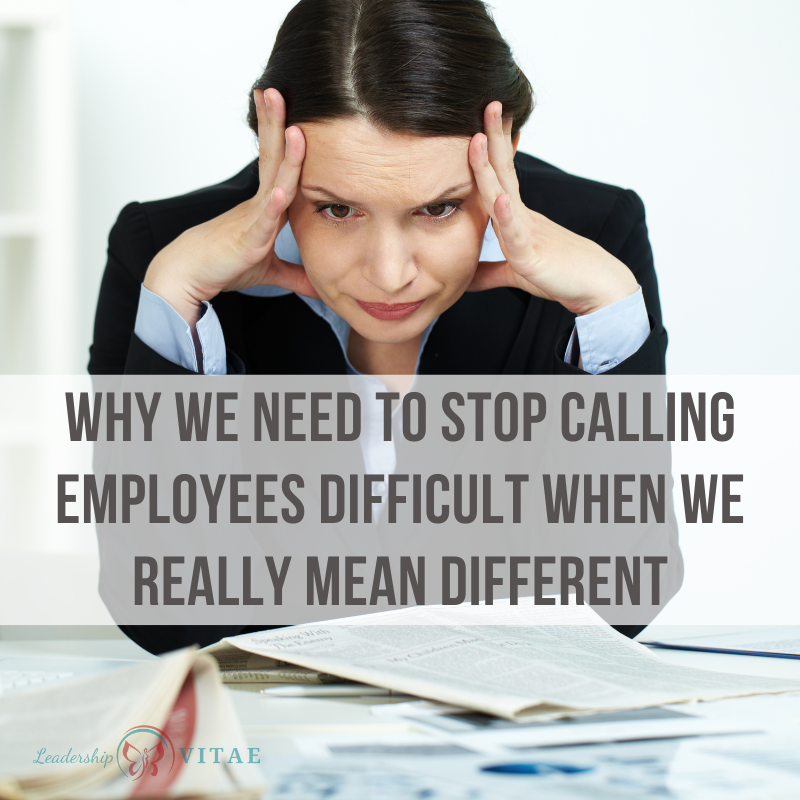
Over the years, my patience level has increased dramatically. I still have my moments, but it has become easier over the years to move from frustrated to empathetic, irritated to understanding.
Except in one area. Difficult employees.
<Sigh>
Another headline about the challenges of difficult people on your team. A coaching course promising to help leaders manage difficult people.
When I see them, I start out sad. Unfortunately, they tend to multiply. There’s been at least three instances this week alone. As they pop up, patience evaporates and I go to the mad place. My blood pressure goes through the roof. Dynamite meet flame. Cue the explosion.
Not literally, as I tend to stuff all that explosive energy inside (fortunately or unfortunately, depending on how you look at it). However, I’ve also learned that such energy needs an outlet, so here I am. Doing my best to let it out in a constructive way.
Look at me grow.
So, what’s my deal with difficult people? I am one. That’s right. Difficult. At least by many peoples’ definitions. Which is why I think we have it all wrong and need to stop with that label.
A history of difficult
Eight years ago, I wrote an article about my history of being difficult and called myself “recovering.” You can read it here.
The reality is that I was never difficult. If not difficult, what was I? Different. I thought and communicated differently and as a result, I was perceived as difficult.
Now, I realize that perception is reality. Po-TAY-to Po-TAH-to…same spud.
I spent years trying to fit in. To demonstrate and behave in whatever arbitrary way was desired, but not clearly communicated.
I was trying to be neurotypical. Newsflash to me (maybe not shocking to others)…I’m not. Instead, I was trying to mask effectively with inconsistent rules and norms. Depending on my team and leader, sometimes I was better at it than others. Sometimes I failed spectacularly.
I wasn’t difficult. I was struggling to fit into an environment that wasn’t designed for me. Everyone around me wanted my particular blend of talents, but not the potential discomfort of preference mismatches that can come with neuro-spicy/neurotypical interactions.
If I’m recovering from anything, it’s from unreasonable expectations and environments that don’t fit. I refute the difficult label. Instead, I’m outspoken, direct, insightful, capable…I can deliver magic. When bias doesn’t get in the way.
It’s not a “you” or “me” problem, it’s a “we” problem
You know the expression “that sounds like a you problem, not a me problem.” I could say that everyone else’s misperception of me is a them problem, not a me problem.
However, we all co-exist in our respective ecosystems. I’ve picked up the same biases over the years. It’s what drives a lot of my guilt and shame when I struggle to show up as I’ve been conditioned to believe is “normal.” Or inadvertently judge someone else struggling with the same stuff I am.
We all need to pause each time we are tempted to label someone difficult. To get curious about ourselves and the other person. Usually what frustrates us most reveals more about us than about others. So what’s driving our frustration?
When someone challenges us and asks 20 questions, why is difficult the label? Maybe they see the problem differently and a question reveals something no one else has considered. Are they really being stubborn, or do they have a well-developed awareness of injustice and are digging in on something that should be addressed to ensure equity?
If they aren’t getting things done on time, do they have a clear understanding of what’s expected? Is the environment safe to ask questions or request help?
There are infinite possibilities about the situation at hand or environment – why are we so quick to judge the person?
Why do labels matter?
Getting back to Po-TAY-to Po-TAH-to…same spud. It’s the same person and the same behaviors, so why does the label matter?
When I use a pejorative term, like difficult, that’s one step towards dehumanizing someone. It makes them “other” in my mind, and (based on my experience) feels like othering on the receiving end.
When I think different, however, there’s an opportunity to find a middle ground or understanding. To build a bridge instead of burn it. We are being taught to be inclusive of difference because diverse perspectives bring about better solutions. Are we told to be inclusive of difficult? Of course not. Yet any perceived difficulty may very well be a result of lack of inclusivity.
Rather than teaching leaders how to deal with difficult people, maybe we should teach them how to get curious in the face of perceived difficulty.
Consider Occam’s Razor
Given the amount of articles, classes, etc out there, you’d think there’s an extremely high percentage of folks that are “difficult.”
I’ll offer a different perspective. Let’s consider that 95% of our processes are waste, with only 5% of steps providing value. Most of us have experienced “new” ideas that are just a rehash of something that was tried and abandoned years ago. A high percentage of projects fail. We often have more meetings than time to do meaningful work. Too much communication, rarely offering insightful or useful content. Constant change and disruption when we still haven’t figured out the last change.
If there are folks asking questions, challenging ideas and assumptions, pushing back…are they being difficult or passionate? Difficult or calling out the unspoken? Chronically late or struggling to prioritize in the face of no priorities?
What’s more likely? That there’s a huge population of difficult people, or that our systems are broken and bloated with more folks calling it out? More struggling with it?
I’ll add one more data point. At least 20% of the population is neuro-spicy. In technology, that number is higher (likely in other fields too). For that 20%, are they difficult, or struggling with how to best communicate in a way that can be received in an environment with no clear playbook? One that’s not designed for them to succeed, but would benefit from their gifts for its success?
It’s time to get curious
I’m going to continue boycotting articles and classes about managing difficult people. Instead, I’m going to do my best to challenge the biases I’ve been conditioned to have and get curious. Interrogate why I get frustrated and what might be driving the behaviors I’d label as “difficult.”
There may very well be difficult employees out there. I’ll admit that. But just like we have an abundance of folks being called “narcissists,” the real percentage of those meeting the diagnostic criteria is quite low. As much as that word is thrown around, you’d think they are on every corner. Nope…there may be behaviors or actions we don’t like, but that doesn’t automatically mean the other person is <insert label here.>
The next time we find ourselves thinking “they are so difficult” it’s time to wonder why. What might be driving the interaction? Are there insights we can find in challenges, pushback, etc? What can we learn about the person or environment by asking questions?
It’s only then we can make the environment more inclusive. Improve our teams – and outcomes – by getting more out of those we are too quick to dismiss as difficult.








